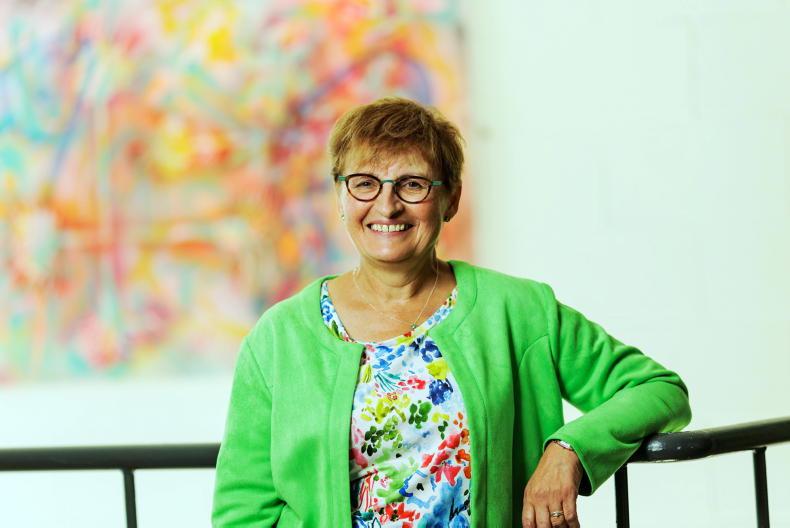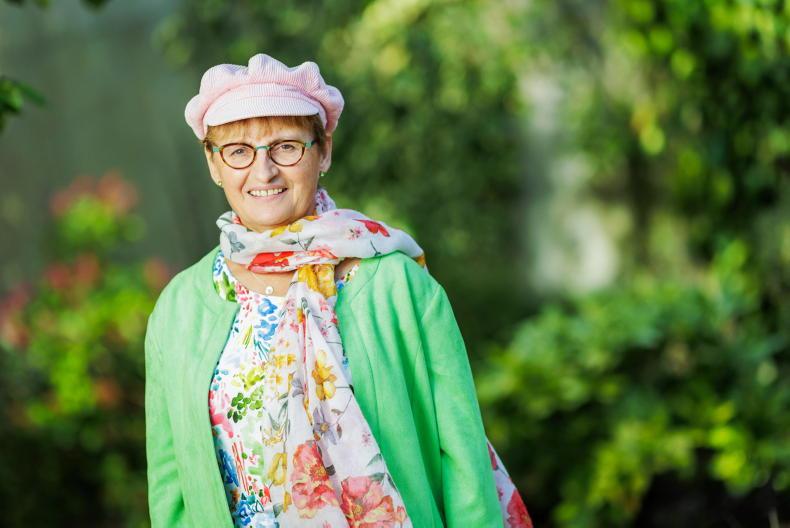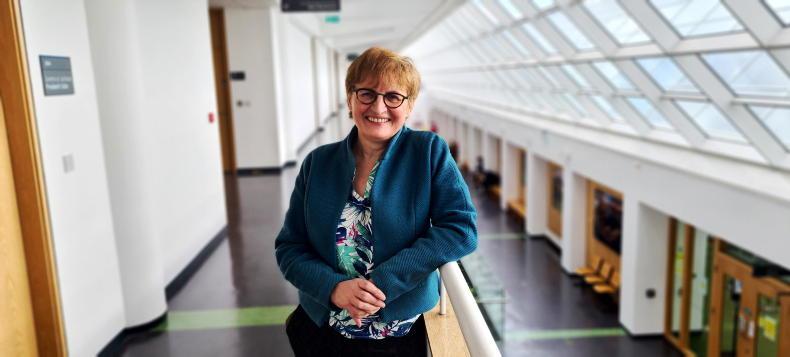Originally from Dublin, Úna Parsons has held a wide variety of roles throughout her career; from owning her own consultancy businesses to holding senior roles with Engineers Ireland and Bausch + Lomb (one of the world’s largest suppliers of eye health products).
Úna is the current head of college Sligo and is also head of the Faculty of Engineering and Design at Atlantic Technological University (ATU Sligo). However, her association with the college stretches back to her own student days as a toolmaking apprentice at the former Sligo Regional Technical College.
As a former apprentice Úna has a particular affinity with the institute, its students and its heritage. Passionate about academia, she is focused on the transition of ATU Sligo into its new university structure and making sure students know the world is their oyster having herself, switched roles many times throughout her career.
Toolmaking apprenticeship
Having excelled in secondary school, Úna always had ambitions to go to college but like many others, after completing her Leaving Cert, she wasn’t really sure which route to go down next.
“Interestingly, I liked sewing,” she says. “It’s something that you do with your hands and it’s quite precise, making patterns and so on. At the time ‘many moons ago’ my mother was doing a course with AnCo [AnCO was set up in 1967, to make better provision for industrial and commercial training]. They were running a course to send women back into the workforce to help them. She came back with the brochures of what courses they were running.”

When Úna read about the AnCo toolmaking apprenticeship, she thought it would be an adventure. At the time, the trade course was set up over four-year block releases. Some of that was with a company and some were either in an Education and Training Board (ETB) training centre or in a third-level institution. “When I was doing it, the first year of the off-the-job was done in the Dundalk Training Centre, which was owned by AnCo [now the Education and Training Boards Ireland (ETBI)],” explains Úna. “The theory aspect of the course was completed in Sligo, as it was the National Training Centre from the 1970s.”
According to Úna, it was very different at the time. She says: “My understanding is I was the second [female] in the country to do toolmaking. The machinery that you’d be working on – I would never have seen anything like it before. “You’re working to very high tolerances [machining tolerance, also known as dimensional accuracy, is the amount of acceptable variance in the dimension of a part],” she continues. “The machine you worked on would measure up to one micron. For context that’s 170th of the thickness of human hair.”
She adds: “Since I did it, it’s become a lot more hi-tech. There are a lot more automated machines; computer numerically controlled machines.”
What is a Toolmaker?
A lot of people don’t know what the term toolmaker refers to, according to Úna. She describes it simply as “industrial tools”.
“It’s really precision tools that are used in the production of metal and plastic and other materials. So, they would get a drawing and from that, they would make the pieces of metal and moulds.”
Experience overseas
When Úna went to college to do her undergraduate degree, she ended up going to Boston for five years to complete a BSc in Mechanical Engineering, which was very exciting for her at the time.
“It was with Braun, who were owned by Gillette in Boston – they were running the scholarship. The agreement was, I’d have to go back [to Ireland] after the five years and work for the company in Carlow. So, I did three and a half years with them then,” she explains.

Out of the five years, Úna spent two years on work experience, which was new at the time. “Now, a lot of courses all over the country have work placements, which really stands to you,” she adds.
Úna also completed a Master’s of Science in advanced manufacturing systems from Brunel University London.
“At the time, you couldn’t continue after your undergrad unless you were up in Dublin,” she says. “But I was living in Carlow and Waterford, so I did distance learning. They would post the assignments over from England and you would do them. That’s the way it was done at the time.”
Responsibilities as head of ATU Sligo
Having always been a great believer in CPD (Continuing Professional Development) and lifelong learning, Úna thinks it’s important to incorporate different things into academia.
“At the Atlantic Technological University, we have 20,000 students and 50% of them are in the workforce. We would pride ourselves as being the leader in online learning in the country; we’ve been doing it for over 20 years,” she says.
On 1 April 2022, Sligo IT joined Letterkenny IT and Galway Mayo IT to become ATU.
“It really is fantastic,” Úna says. “We have 600 programmes between all of them (the ATU campuses). Our aim is to serve our stakeholders in the region and beyond. We’re coming together as one university, and we’re kind of in the discovery phase at the moment.”
She has two roles in ATU Sligo. “I’m the head of the Faculty of Engineering and Design, which is a large faculty – there’s 4,000 students and over 200 staff,” she says, noting that she is also the head of the college in Sligo.
Reducing waste on campus
ATU campuses have recently achieved a 75% recycling waste reduction as part of a sustainability drive to be greener.
“We’ve just joined the major European project called EU Green [Alliance] of the European universities. It would be high on our radar and I suppose, I am married to a farmer and we have just started the conversion process to go organic [on their beef suckler farm just outside Sligo]”, says Úna.

.
The move is part of the University’s ongoing efforts to promote environmental sustainability and reduce its carbon footprint. “There was a lot of contamination in the rubbish bins, so they decided to close the rubbish bins, and now everybody’s bringing back their tray. The catering staff, segregate them properly”, Úna outlines.
Having worked in academia for the last 11 years, spending 20 years in multinational manufacturing companies and 10 years working for professional bodies, Úna advises: “I would say to anyone: the world is your oyster. I have switched careers many times. I had my own business twice, I was made redundant twice, and I looked at the opportunity to change direction and try different things, so never be afraid to change.”
As students prepare to sit the first of their Leaving Cert examinations next week (7 June), Úna reminds students to remember you have up until 1 July to access the change of mind facility on the CAO system www.cao.ie.
After sitting your exams, Úna recommends completing an audit of your results.
“Ask yourself, honestly, what you have achieved in each subject and look again at your CAO choices. Get in the car and visit the colleges you have selected. See what you think of these colleges. Do you see yourself studying here for the next four years?”
If you would like to visit ATU Sligo and speak to a careers adviser, Úna urges students to contact the college: “We would be delighted to speak to you and offer you advice. Contact us on 087-23621112”.”
Read more
Meath school chosen as Ireland's fittest
Young innovators impress at Student Enterprise Final
Originally from Dublin, Úna Parsons has held a wide variety of roles throughout her career; from owning her own consultancy businesses to holding senior roles with Engineers Ireland and Bausch + Lomb (one of the world’s largest suppliers of eye health products).
Úna is the current head of college Sligo and is also head of the Faculty of Engineering and Design at Atlantic Technological University (ATU Sligo). However, her association with the college stretches back to her own student days as a toolmaking apprentice at the former Sligo Regional Technical College.
As a former apprentice Úna has a particular affinity with the institute, its students and its heritage. Passionate about academia, she is focused on the transition of ATU Sligo into its new university structure and making sure students know the world is their oyster having herself, switched roles many times throughout her career.
Toolmaking apprenticeship
Having excelled in secondary school, Úna always had ambitions to go to college but like many others, after completing her Leaving Cert, she wasn’t really sure which route to go down next.
“Interestingly, I liked sewing,” she says. “It’s something that you do with your hands and it’s quite precise, making patterns and so on. At the time ‘many moons ago’ my mother was doing a course with AnCo [AnCO was set up in 1967, to make better provision for industrial and commercial training]. They were running a course to send women back into the workforce to help them. She came back with the brochures of what courses they were running.”

When Úna read about the AnCo toolmaking apprenticeship, she thought it would be an adventure. At the time, the trade course was set up over four-year block releases. Some of that was with a company and some were either in an Education and Training Board (ETB) training centre or in a third-level institution. “When I was doing it, the first year of the off-the-job was done in the Dundalk Training Centre, which was owned by AnCo [now the Education and Training Boards Ireland (ETBI)],” explains Úna. “The theory aspect of the course was completed in Sligo, as it was the National Training Centre from the 1970s.”
According to Úna, it was very different at the time. She says: “My understanding is I was the second [female] in the country to do toolmaking. The machinery that you’d be working on – I would never have seen anything like it before. “You’re working to very high tolerances [machining tolerance, also known as dimensional accuracy, is the amount of acceptable variance in the dimension of a part],” she continues. “The machine you worked on would measure up to one micron. For context that’s 170th of the thickness of human hair.”
She adds: “Since I did it, it’s become a lot more hi-tech. There are a lot more automated machines; computer numerically controlled machines.”
What is a Toolmaker?
A lot of people don’t know what the term toolmaker refers to, according to Úna. She describes it simply as “industrial tools”.
“It’s really precision tools that are used in the production of metal and plastic and other materials. So, they would get a drawing and from that, they would make the pieces of metal and moulds.”
Experience overseas
When Úna went to college to do her undergraduate degree, she ended up going to Boston for five years to complete a BSc in Mechanical Engineering, which was very exciting for her at the time.
“It was with Braun, who were owned by Gillette in Boston – they were running the scholarship. The agreement was, I’d have to go back [to Ireland] after the five years and work for the company in Carlow. So, I did three and a half years with them then,” she explains.

Out of the five years, Úna spent two years on work experience, which was new at the time. “Now, a lot of courses all over the country have work placements, which really stands to you,” she adds.
Úna also completed a Master’s of Science in advanced manufacturing systems from Brunel University London.
“At the time, you couldn’t continue after your undergrad unless you were up in Dublin,” she says. “But I was living in Carlow and Waterford, so I did distance learning. They would post the assignments over from England and you would do them. That’s the way it was done at the time.”
Responsibilities as head of ATU Sligo
Having always been a great believer in CPD (Continuing Professional Development) and lifelong learning, Úna thinks it’s important to incorporate different things into academia.
“At the Atlantic Technological University, we have 20,000 students and 50% of them are in the workforce. We would pride ourselves as being the leader in online learning in the country; we’ve been doing it for over 20 years,” she says.
On 1 April 2022, Sligo IT joined Letterkenny IT and Galway Mayo IT to become ATU.
“It really is fantastic,” Úna says. “We have 600 programmes between all of them (the ATU campuses). Our aim is to serve our stakeholders in the region and beyond. We’re coming together as one university, and we’re kind of in the discovery phase at the moment.”
She has two roles in ATU Sligo. “I’m the head of the Faculty of Engineering and Design, which is a large faculty – there’s 4,000 students and over 200 staff,” she says, noting that she is also the head of the college in Sligo.
Reducing waste on campus
ATU campuses have recently achieved a 75% recycling waste reduction as part of a sustainability drive to be greener.
“We’ve just joined the major European project called EU Green [Alliance] of the European universities. It would be high on our radar and I suppose, I am married to a farmer and we have just started the conversion process to go organic [on their beef suckler farm just outside Sligo]”, says Úna.

.
The move is part of the University’s ongoing efforts to promote environmental sustainability and reduce its carbon footprint. “There was a lot of contamination in the rubbish bins, so they decided to close the rubbish bins, and now everybody’s bringing back their tray. The catering staff, segregate them properly”, Úna outlines.
Having worked in academia for the last 11 years, spending 20 years in multinational manufacturing companies and 10 years working for professional bodies, Úna advises: “I would say to anyone: the world is your oyster. I have switched careers many times. I had my own business twice, I was made redundant twice, and I looked at the opportunity to change direction and try different things, so never be afraid to change.”
As students prepare to sit the first of their Leaving Cert examinations next week (7 June), Úna reminds students to remember you have up until 1 July to access the change of mind facility on the CAO system www.cao.ie.
After sitting your exams, Úna recommends completing an audit of your results.
“Ask yourself, honestly, what you have achieved in each subject and look again at your CAO choices. Get in the car and visit the colleges you have selected. See what you think of these colleges. Do you see yourself studying here for the next four years?”
If you would like to visit ATU Sligo and speak to a careers adviser, Úna urges students to contact the college: “We would be delighted to speak to you and offer you advice. Contact us on 087-23621112”.”
Read more
Meath school chosen as Ireland's fittest
Young innovators impress at Student Enterprise Final









 This is a subscriber-only article
This is a subscriber-only article











SHARING OPTIONS: